- Home
- Jerry Spinelli
Stargirl Page 11
Stargirl Read online
Page 11
The state contest was a week away. Every day she practiced her speech. One day she called over little Peter Sinkowitz and his playmates and presented the speech to us from her front steps. We applauded and whistled. She bowed grandly, and I, too, began to see her vision. I saw the streamers flying and I heard the crowd cheering, and I believed.
27
“…and our best wishes go with you, Susan Caraway.”
The PA announcement echoed through the school lobby, and we were off to Phoenix. The driver was Mr. McShane, Mica High’s faculty representative to the state contest. Susan and I sat in the back. Susan’s parents were driving their own car and would meet us in Phoenix.
As we pulled out of the parking lot, she wagged a finger in my face. “Don’t get a big head, mister. I was allowed to invite two friends along. You weren’t the only one I asked.”
“So who was the other?” I said.
“Dori.”
“Well, then,” I said, “I think I’ll go for the big head. Dori isn’t another guy.”
She grinned. “No, she’s not one of those.” Suddenly she unbuckled her seat belt—we each had a back window. “Mr. McShane,” she announced, “I’m moving over so I can sit close to Leo. He’s so cute, I can’t help myself.”
In the rearview mirror, the teacher’s eyes crinkled. “Whatever you like, Susan. It’s your day.”
She slid over and fastened herself into the middle belt. She jabbed me. “Hear that? It’s my day. I get whatever I want.”
“So,” I said, “what happened when you asked Dori Dilson?”
“She said no. She’s mad at me.”
“I could tell.”
“Ever since I became Susan. She thinks I betrayed myself. She just doesn’t understand how important it is to be popular.”
I wasn’t sure what to say to that. I was feeling a little uneasy. Fortunately, wondering what to say wasn’t much of a problem for me during that two-hour ride, because Susan chattered away like the old Stargirl the whole time.
“But I know Dori,” she said, “and I’ll tell you one thing.”
“What’s that?”
“She’ll be in the front of the mob cheering for me when we get back tomorrow.”
I later found out that after we left the school, the principal had spoken again on the PA. He announced our expected time of return on Saturday and suggested that everyone be on hand to meet us, win or lose.
Losing, as it turned out, never occurred to the contestant herself.
“Would you do a favor for me?” she said.
I told her sure.
“That big silver plate that goes to the winner? I’m such a klutz with dishes at home. Would you hold it for me when the crowd rushes us? I’m afraid I’ll drop it.”
I stared at her. “What crowd? What rush?”
“In the school parking lot. When we get back tomorrow. There’s always a crowd waiting for the returning hero. Remember the film at school? My vision?” She cocked her head and peered into my eyes. She rapped my forehead with her knuckle. “Hello in there. Anybody home?”
“Oh,” I said. “That crowd.”
She nodded. “Exactly. Of course, we’ll be safe as long as we’re in the car. But once we get out, who knows what will happen. Crowds can get pretty wild. Right, Mr. McShane?”
The teacher nodded. “So I hear.”
She spoke to me as if instructing a first-grader. “Leo, this has never happened in Mica before, having a winner of the Arizona state oratorical contest. One of their very own. When they hear about it, they’re going to go bananas. And when they get a gander at me and that trophy—” She rolled her eyes and whistled. “I just hope they don’t get out of hand.”
“The police will keep them in line,” I said. “Maybe they’ll call out the National Guard.”
She stared wide-eyed. “You think?” She didn’t realize I was kidding. “Well,” she said, “I’m really not afraid for myself. I won’t mind a little jostling. Do you think they’ll jostle, Mr. McShane?”
In the mirror his eyes shifted to us. “Never can tell.”
“And if they want to carry me around on their shoulders, that’s okay, too. But they better not”—she poked me with her finger—“better not mess with my trophy. That’s why you”—another poke—“are going to hold it. Tight.”
I wished Mr. McShane would say something. “Susan,” I said, “did you ever hear of counting your chickens?”
“Before they hatch, you mean?”
“Exactly.”
“I hear you’re not supposed to.”
“Exactly.”
She nodded thoughtfully. “Never made much sense to me. I mean, if you know they’re going to hatch, why not count them?”
“Because you can’t know,” I said. “There’re no guarantees. I hate to break this to you, but you’re not the only person in the contest. Somebody else could win. You could lose. It’s possible.”
She thought about that for a moment, then shook her head. “Nope. Not possible. So…” She threw up her arms and smiled hugely. “Why wait to feel great? Celebrate now, that’s my motto.” She nuzzled into me. “What’s yours, big boy?”
“Don’t count your chickens,” I said.
She shuddered mockingly. “Ouuu. You’re such a poop, Leo. What’s your motto, Mr. McShane?”
“Drive carefully,” he said, “you may have a winner in the car.”
That set her off howling.
“Mr. McShane,” I said, “you’re not helping.”
“Sorry,” he lied.
I just looked at her. “You’re going to be in a state contest,” I said. “Aren’t you just a little bit nervous?”
The smile vanished. “Yes, I am. I’m a lot nervous. I just hope things don’t get out of hand when we get back to the school. I’ve never been adored by mobs of people before. I’m not sure how I’m going to react. I hope I don’t get a big head. Do you think I’m the big-head type, Mr. McShane?”
I raised my hand. “Can I answer that?”
“I think your head is just fine,” said the teacher.
She jabbed me with her elbow. “Hear that, Mr. Know-it-all?” She gave me her smug face, which promptly disappeared as she thrust up her arms and yelped, “They’re going to love me!”
Mr. McShane wagged his head and chuckled. Silently I gave up.
She pointed out the window. “Look, even the desert is celebrating.”
It seemed to be true. The normally dull cacti and scrub were splashed with April colors, as if a great painter had passed over the landscape with a brush, dabbing yellow here, red there.
Susan strained against her seat belt. “Mr. McShane, can we stop here, just for a minute? Please?” When the teacher hesitated, she added, “You said it’s my day. I get whatever I want.”
The car coasted to a stop along the gravelly roadside. In a moment, she was out the door and bounding across the desert. She skipped and whirled and cartwheeled among the prickly natives. She bowed to a yucca, waltzed with a saguaro. She plucked a red blossom from a barrel cactus and fixed it in her hair. She practiced her smile and her nod and her wave—one-hand, two-hand—to the adoring mob at her hero’s welcome. She snapped a needle from a cactus and with the slapstick pantomime of a circus clown pretended to pick her teeth with it.
Mr. McShane and I were leaning on the car, laughing, when suddenly she stopped, cocked her head, and stared off in another direction. She stayed like that, stone still, for a good two minutes, then abruptly turned and came back to the car.
Her face was thoughtful. “Mr. McShane,” she said as the teacher drove off, “do you know any extinct birds?”
“Passenger pigeon,” he said. “That’s probably the best known. They say there used to be so many of them they would darken the sky when they flew over. And the moa.”
“Moa?”
“Huge bird.”
“Like a condor?” I said.
He chuckled. “A condor wouldn’t come up to its knee. Make
an ostrich look small. Twelve, thirteen feet tall. Maybe the biggest bird ever. Couldn’t fly. Lived in New Zealand. Died out hundreds of years ago. Killed off by people.”
“Half their size,” said Susan.
Mr. McShane nodded. “Mm. I wrote a report about moas in grade school. I thought they were the neatest thing.”
Susan’s eyes were glistening. “Did moas have a voice?”
The teacher thought about it. “I don’t know. I don’t know if anybody knows.”
Susan looked out the window at the passing desert. “I heard a mockingbird back there. And it made me think of something Archie said.”
“Mr. Brubaker?” said Mr. McShane.
“Yes. He said he believes mockingbirds may do more than imitate other birds. I mean, other living birds. He thinks they may also imitate the sounds of birds that are no longer around. He thinks the sounds of extinct birds are passed down the years from mockingbird to mockingbird.”
“Interesting thought,” said Mr. McShane.
“He says when a mockingbird sings, for all we know it’s pitching fossils into the air. He says who knows what songs of ancient creatures we may be hearing out there.”
The words of Archie Brubaker settled over the silence in the car. As if reading my thoughts, Mr. McShane turned off the air conditioner and powered down the windows. Hair blew in a faint, smoky scent of mesquite.
After a while I felt the touch of Susan’s hand. Her fingers wove through mine.
“Mr. McShane,” she cooed, “we’re holding hands in the back seat.”
“Uh-oh,” he said, “hormonal teenagers.”
“Don’t you think he’s cute, Mr. McShane?”
“I never really thought about it,” said the teacher.
“Well, look,” she said. She grabbed my face in her hand and pulled it forward. The teacher’s eyes considered me briefly in the rearview mirror.
“You’re right. He’s adorable.”
Susan released my blushing face. “Told you. Don’t you just love him?”
“I wouldn’t go that far.”
A minute later: “Mr. McSha-ane…” Now I felt something in my ear. “I’m putting my finger in his ear…”
This sort of silliness went on until we rounded a mesa and saw the brown mist on the horizon that announced our approach to the city of Phoenix.
28
Her parents met us in the lobby of the hotel where Susan, Mr. McShane, and I each had a room for the night. After we checked in, the five of us ate a buffet lunch in the hotel restaurant. Then we watched Susan board a bus that would take her and eighteen other contestants to Phoenix West High School. There were thirty-eight contestants; nineteen had already given their speeches that morning.
By the end of the afternoon, ten finalists would be chosen. The finals would take place that evening.
To be honest, none of us was surprised that Susan made the cut. She was incredibly good. The surprise was this: her speech was new. It was not the one she had given at Mica High. It was not the one she had been practicing for weeks in front of me and Peter Sinkowitz and assorted saguaros. It was not the one I had heard just the day before.
But it was wonderful.
There were some elements of the old speech in it, and much that was as new as that morning. Like a butterfly, her words fluttered from image to image. She swung from the distant past (Barney, Archie’s Paleocene rodent skull) to the present (Cinnamon) to the distant future (the death of the sun). From the most ordinary here (the old man nodding off on the bench at Tudor Village) to the most extraordinary there (a newly discovered galaxy ninety percent to the end of the universe). She touched on silver lunch trucks and designer labels and enchanted places, and when she said her best friend gave her pet rat a ride on his shoulder, tears came to my eyes. It was a jumble, it was a mishmash, and somehow she pulled it all together, somehow she threaded every different thing through the voice of a solitary mockingbird singing in the desert. She called her speech “I Might Have Heard a Moa.”
The auditorium was half full, mostly with small groups of students and parents from the competing schools. After a contestant finished, his or her supporters whistled and whooped, as if doing so would influence the judges. The rest was polite applause.
When Susan finished, the four of us managed a modest cheer, but that was about it. No whistles, no whoops. I think we were made of more timid stuff than the speechmaker herself.
Back at the hotel Mr. McShane and I mobbed her, if two can be a mob. Her parents were more reserved. They were full of smiles and “well dones,” but they seemed no more surprised at her success than Susan did.
When the adults went off to the gift shop, I had her to myself. I said, “Where did that come from?”
She grinned. “Did you like it?”
“Sure, but it’s not what I’ve been hearing for the last month. What were you doing, practicing a secret speech on the side?”
The grin got wider. “Nope. That was the first time I heard it, too.”
I stared at her. Slowly her words sank in. “Let me get this straight. You’re saying you just made it up this morning?”
“I’m saying I didn’t even make it up. It was just there. All I did was open my mouth and let it out.” She held both hands out to me and snapped her fingers. “Presto!”
I gaped at her. “What are you going to say tonight?”
She threw out her arms: “Who knows?”
The five of us ate an early dinner in the hotel restaurant. Afterward, we waited in the lobby while Susan changed clothes. She stepped off the elevator wearing a peach-colored pantsuit. She slinked across the lobby, modeling for us. She sat on her mother’s lap and said, “My personal seamstress made it for me.” We applauded lightly and sent her off on the bus.
The general public was invited to the evening show, and the auditorium was packed. People stood in back. Down front, a high school orchestra played rousing music by John Philip Sousa. The ten contestants sat onstage. Seven were boys. All of the contestants appeared to be grim and nervous, stiff as manikins, except for Susan, who was bending the ear of the boy sitting next to her. He nodded occasionally but kept his eyes and spine at attention and obviously wished that she would shut up. Susan’s parents chuckled knowingly at her behavior, while I tried to disguise a stab of jealousy.
One by one the contestants took the long walk to center stage to give their speeches. The applause was equally hearty for all. A grade school girl in a frilly white dress handed each contestant a bouquet of roses, yellow for the girls, red for the boys. While the girls cradled their roses, the boys looked at them as if they were hand grenades.
Susan was next to last to speak. When her name was called, she bounced up from her chair and practically ran to the microphone. She did a sprightly pirouette, a curtsy, waved her hand in a window-washer motion, and said, “Hi.” Accustomed to seeing stiff, mortified contestants, the audience responded with uncertain titters. They didn’t know what to make of this unconventional teenager any more than we had on the first day of school. Several bold souls said “Hi” and waved back.
She did not begin, at least not in the usual sense. There was no ringing preamble. She merely stood there comfortably chatting away as if we were all on rocking chairs on her front porch. Murmur drifted toward the ceiling; people were waiting for her to get started. The murmur subsided as it occurred to them that this was it and they were missing it. The quiet that then fell over the auditorium was absolute. I was more tuned in to the audience than to the speaker, and if for the last five minutes of her talk anyone was breathing, I could not detect it. When she finished with barely a whisper—“Can you hear it?”—and leaned with her cupped hand to her ear, fifteen hundred people seemed to inch forward, straining to hear. There were ten seconds of purest stillness. Then she turned abruptly and went back to her chair. Still there was no reaction. What’s going on? I wondered. She sat forward in her chair, her hands folded primly in her lap. And then it came, suddenly, explosivel
y, as if everyone had awakened at once. We were all on our feet, clapping and shouting and whistling. I found myself sobbing. The cheering was as wild as that of the crowd at a championship basketball game.
29
She won. As she had said she would.
The silver plate they gave her twinkled like a starburst in a galaxy of flashing cameras. Two TV crews washed her in lights and interviewed her backstage. Strangers mobbed her, citizens of Phoenix gushing, telling her they had been coming to the contest for years and had never heard anything like it. Schoolchildren thrust programs in her face for autographs. Every parent wanted her for a daughter, every teacher for a student.
She was so happy, she was so proud. She yelped and cried when she saw us. She hugged each of us in turn, and I thought she would squeeze the breath out of me.
Back at the hotel everyone already seemed to know: the doorman, the desk manager, the people in the lobby and elevator. Suddenly she had this magical, wonderful power; whoever laid eyes on her smiled. And the English language dwindled to a single word, repeated over and over: “Congratulations!”
We walked—we floated—around the block to burn off our excess energy. Back at the hotel we were invited into the nightclub, even though Susan and I were underage. We drank ginger ales and ordered jalapeño poppers and we all danced to a country and western band while Susan’s face beamed on the late news from the TV above the bar. The dance floor was the only place where she did not carry her silver plate.
First thing next morning there she was, sliding under the door of my hotel room: her picture on the front page of the Arizona Republic. I sat on the edge of the bed and stared at it, pride welling in me. I read the story. It called her speech “mesmerizing, hypnotic, mysteriously touching.” I pictured folded morning papers tossed from cars, landing in driveways all over Mica.
We all met for the breakfast buffet. People stared and nodded and smiled and silently lip-said “Congratulations” across the restaurant. We headed for home in a two-car caravan.

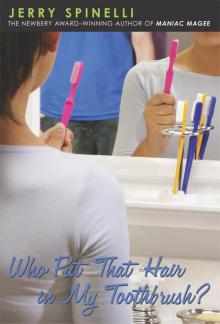 Who Put That Hair in My Toothbrush?
Who Put That Hair in My Toothbrush?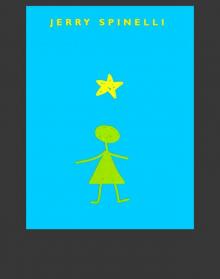 Stargirl
Stargirl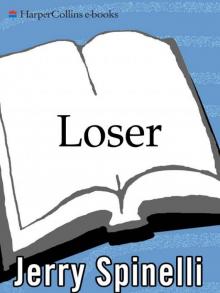 Loser
Loser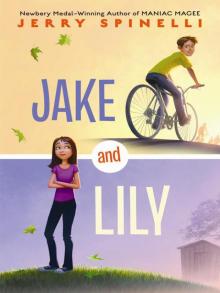 Jake and Lily
Jake and Lily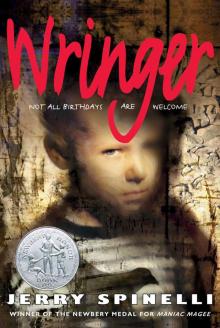 Wringer
Wringer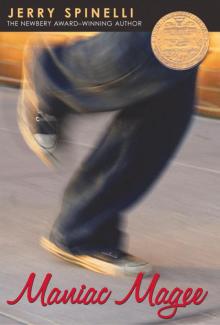 Maniac Magee
Maniac Magee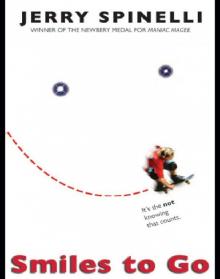 Smiles to Go
Smiles to Go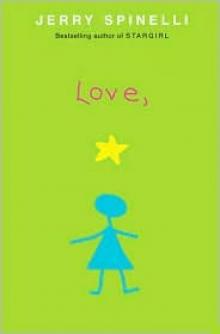 Love, Stargirl
Love, Stargirl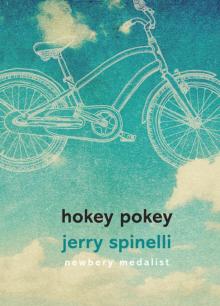 Hokey Pokey
Hokey Pokey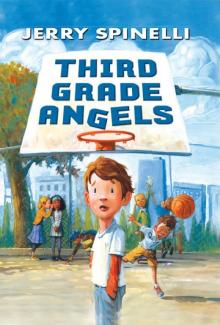 Third Grade Angels
Third Grade Angels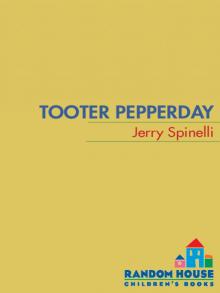 Tooter Pepperday: A Tooter Tale
Tooter Pepperday: A Tooter Tale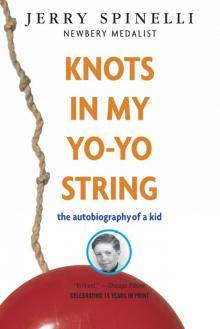 Knots in My Yo-Yo String Knots in My Yo-Yo String
Knots in My Yo-Yo String Knots in My Yo-Yo String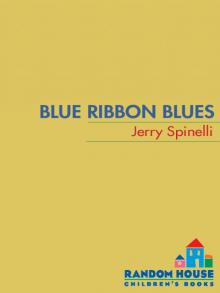 Blue Ribbon Blues: A Tooter Tale
Blue Ribbon Blues: A Tooter Tale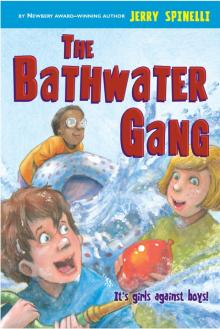 The Bathwater Gang
The Bathwater Gang Crash
Crash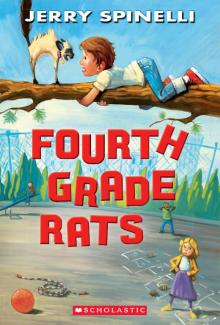 Fourth Grade Rats
Fourth Grade Rats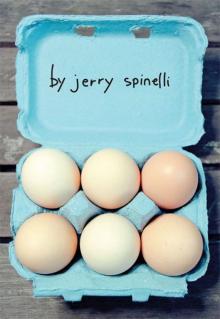 Eggs
Eggs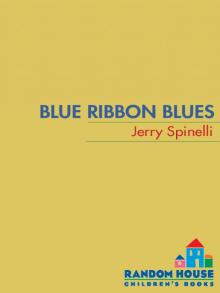 Blue Ribbon Blues
Blue Ribbon Blues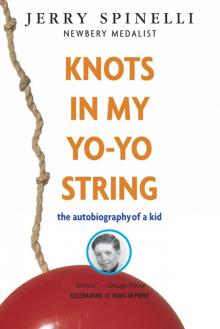 Knots in My Yo-Yo String
Knots in My Yo-Yo String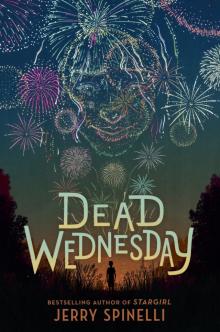 Dead Wednesday
Dead Wednesday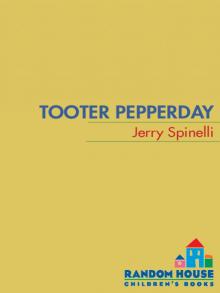 Tooter Pepperday
Tooter Pepperday